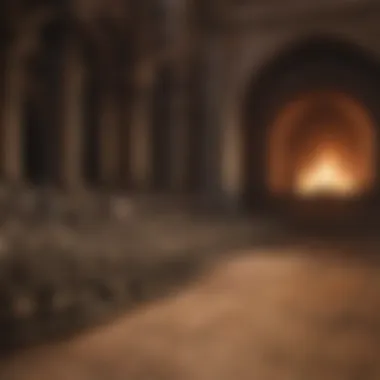Exploring the Musical Depths of Game of Thrones


Intro
The world of Game of Thrones is not just painted with gripping narratives and extensive lore; it is heavily underscored by a carefully crafted soundtrack that defines its atmosphere and enhances its emotional landscape. Composed primarily by Ramin Djawadi, the score’s ability to evoke feelings, underscore character journeys, and heighten pivotal moments makes it an integral part of the series. This exploration goes beyond mere notes on a staff; it delves into how music shapes our understanding of the characters, contextualizes events, and enriches the storytelling experience.
Through this article, we will unpack the various dimensions of the Game of Thrones soundtrack, spotlighting key characters and their thematic musical motifs, dissecting episodes that left a lasting impact, exploring the rich lore embedded within the music, and even diving into fan theories that speculate on the deeper meanings behind the sounds.
Character Dissections
Key Characters and Their Themes
The characters of Game of Thrones are multi-faceted, each complex in their motivations and transformations. Their arcs are often mirrored by distinct musical themes, allowing the audience to connect with them on an emotional level. For example:
- Jon Snow: His theme is characterized by a somber yet heroic tone, underscoring his struggles and gradual rise as a leader.
- Daenerys Targaryen: The melody is powerful and grand, reflecting her journey from a meek girl to a formidable Queen.
- Cersei Lannister: The dark and foreboding notes associated with her character highlight her ruthless ambition and cunning nature.
These themes do not just serve as background music; they mirror the inner lives of the characters and accentuate their key moments.
Character Development Through Music
Throughout the series, character growth is often punctuated by shifts in their respective musical scores. Consider when Jon’s theme begins to incorporate elements of triumph as he ultimately realizes his destiny. This evolution in music reflects the change in his character from an outsider to a hero fighting for the realm. Conversely, Cersei’s theme grows increasingly menacing as her moral decline deepens, a signal to the audience of her moral decay.
Impact on the Overarching Storyline
Music in Game of Thrones serves not only to highlight character arcs but also to weave an intricate tapestry of the show's overarching narrative. The soundtrack creates an emotional backdrop that allows viewers to experience the weight of betrayal, loss, and triumph. For instance, during the infamous Red Wedding, the chilling contrast between the cheerful tune and the brutal events amplifies the horror of the scene—an example of effective sound narrative that resonates deeply with audiences.
Episode Breakdowns
Significant Moments and Themes
Analyzing key episodes helps to further elucidate how music amplifies narrative elements. In episodes like "The Rains of Castamere," the haunting melody foreshadows tragedy, encapsulating the essence of the Stark family’s despair.
- The Battle of the Bastards features a score that heightens the tension, blending chaos with an underlying sense of honor that defines Jon Snow’s character.
- The finale episode, where the culmination of all storylines occurs, is underpinned by a score that resonates with nostalgia for all the fallen characters, leading to an emotionally impactful closure.
Themes and Symbolism
Every episode often introduces new themes that align with the motives and struggles faced by the characters. Recurring motifs, such as the Stark theme representing honor and family ties, juxtaposed with the Lannister tune symbolizing power and betrayal, create a rich tapestry that adds layers of meaning to the visual storytelling.
Lore Explorations
Uncovering Hidden Details
The tracklist of the soundtrack also hides small references to the lore that fans might miss. For instance, the use of Rains of Castamere within the narrative alludes to historical events woven throughout Westeros, enriching the viewer’s experience with deeper insight.
Cultural and Mythical Aspects
Many motifs echo cultural themes prevalent in both the story and real-world history. The music often hints at the mythical aspects of Westeros—dragons, the North, and the long-forgotten stories that shape character motives and history, allowing deeper connections to be made.
Fan Theories
Popular Speculations and Evidence
Fans have created numerous theories around the soundtrack, stirring deep discussions about potential connections to the storyline. Some speculate that specific chords foreshadow character deaths or transformations, tying musical cues directly to plot points.
Implications for Future Developments
The prowess of the soundtrack can lead one to ponder how future storylines may unfold. Will new themes emerge for characters not yet introduced? What musical layers could signify alliances and betrayals yet to come?
Music in Game of Thrones is more than mere accompaniment; it is a narrative force that provides depth and emotional context. As we dive deeper into the analysis of this extraordinary score, we find that every note resonates with the very fabric of the characters and the world they inhabit. The exploration of this soundtrack is essential for understanding not only the series but also its cultural significance.
The Role of Music in Television
Music serves as the invisible thread that weaves together the narrative tapestry of television. In the realm of shows like Game of Thrones, it becomes an essential element that pulses with life, shaping how stories unfold and how viewers engage with the characters and their journeys. By employing specific sounds and themes, composers can craft an atmosphere that resonates deeply, leading audiences to feel a part of the story rather than mere observers.
The most remarkable aspect of music in television is its ability to establish a unique atmosphere that mirrors the world being portrayed on screen. From the foreboding tones of the opening credits to the soaring melodies that accompany pivotal moments, sound choices have a direct hand in setting the tone for entire episodes or arcs. The right score can transport viewers right into the heart of Westeros, adding grains of salt to the emotional experience of each scene.


Establishing Atmosphere
Music can create a backdrop, rich and immersive, enhancing visual storytelling. Take, for example, the haunting notes that echo during scenes in the eerie cold of the North. Such music not only underscores the landscape but also reflects the very soul of the characters inhabiting it. The use of instruments like the cello or woodwinds often evokes a sense of melancholy, reminding us that this world is rife with danger, intrigue, and despair. Conversely, a bright and lively score can signify hope or unity, quickly shifting the mood and emphasizing triumph or camaraderie.
Moreover, these intricate soundscapes can also serve as a cue for audiences, subtly guiding them in how to feel about a given scene. When the score swells, building anticipation for a showdown or a heartfelt moment, it connects emotion to the action, immersing viewers deeper into the narrative.
Building Emotion
In addition to establishing atmosphere, music plays a pivotal role in drawing out emotional responses from viewers. Themes often associated with key characters can evoke feelings of nostalgia, sadness, or exhilaration, depending on the context presented. For instance, the simple yet powerful theme of Jon Snow resonates with a somber strength, reminding us of his struggles and sacrifices. Each note gently nudges the viewer into understanding his sorrow or determination, making the character's arc all the more compelling.
"Music assists in developing a connection that visuals alone might not provide. The notes linger long after the screen fades to black, resonating within us."
The effective use of leitmotifs—a recurring musical theme associated with a specific character or event—allows for layered emotional storytelling. For instance, Daenerys Targaryen's theme carries with it the weight of her family’s legacy, ambitions, and the complexities of her character. This layered understanding is crafted through subtle yet deliberate instrumentation and melody, compelling viewers to feel invested in her journey.
Building emotion through music involves a delicate balance. It's not just about creating a beautiful melody but structuring it in such a way that it complements the narrative without overpowering it. The resulting sound—rich in both its complexity and simplicity—can evoke tears, joy, or even rage, making the viewer's experience all the more engaging. Through well-placed notes and thoughtful compositions, the music ultimately enhances the visual experience, creating a harmonious union of sound and sight that defines what makes great television.
Prolusion to Game of Thrones
The world of Game of Thrones is not just a tale of dragons, battles, and royal intrigues; it’s woven tightly with the powerful threads of music that enhance every moment of the series. Understanding this soundtrack is vital for grasping how it shapes the narrative and emotional landscape of the show. Much like the vibrant colors in a painting, music adds depth and meaning, revealing nuances that might otherwise go unnoticed. As we venture into the heart of this iconic series, the interplay between its narrative and musical score becomes clear, showing how each note drives the story forward and intensifies viewer engagement.
Synopsis of the Series
Game of Thrones, adapted from George R.R. Martin’s book series A Song of Ice and Fire, immerses viewers in the gritty, complex world of Westeros, where noble families vie for power and control over the Iron Throne. The series, spanning eight seasons, introduces a multitude of characters, each with their own arc and motives, battling not only each other but also existential threats posed by the Night King and his army of the dead. It is a rich tapestry of alliances and betrayals, underscored by intelligent political maneuvering and deep-rooted histories that echo through generations. The consequence of every action reverberates across the realm, crafting a narrative as sprawling as it is intricate.
The Importance of Narrative
A narrative serves as the backbone of any story, but in Game of Thrones, it takes center stage, guiding both character development and plot progression. The series excels in subverting traditional archetypes, portraying characters that evolve in unpredictable ways. The narrative invites viewers to immerse themselves in the complexities of each character’s journey. Here, music plays a pivotal role, not merely supplementing scenes but profoundly influencing them. Themes often mirror character growth, signaling transformations that resonate on an emotional level. For instance, the music associated with Jon Snow reflects his internal struggles and gradual ascent to power, while Daenerys's theme uncovers her arc from a scared girl to a formidable leader.
While drama unfolds on screen, the score acts as a bridge connecting audiences to these pivotal moments, allowing for a deeper understanding of each character's motivations and personal conflicts. In this layered storytelling environment, the soundtrack does more than simply accompany the action; it elevates it, changing how viewers perceive and connect with the story being told.
Understanding the Soundtrack
The soundtrack of Game of Thrones serves as a backbone to its vast narrative, weaving together the intricate threads of plot and character. Music is not merely an accessory; it is a vital component that supports and enhances the story's emotional tapestry. By understanding the soundtrack, fans can appreciate how sound elevates experiences, whether it’s through the heart-pounding build-up of tension or the melancholic strains accompanying a character's demise.
This deep dive into the world of scoring reveals key elements like the identity of the composers, the choices made in instrumentation, and how these elements come together to shape the show’s atmosphere. Each note, each pause, contributes to the immersion in the harsh yet beautiful landscapes of Westeros.
Exploring the soundtrack also introduces discussions about:
- Character-driven motifs: Themes associated with specific characters, giving them deeper resonance with the audience.
- Cultural contexts: How music has shifted perceptions of the series in broader cultural discussions.
- Technical mastery: Insights into recording processes that reveal the craft behind the music.
In essence, gaining a grasp on the soundtrack unveils layers of meaning that enrich the viewer's understanding and appreciation of the show.
Composers and Collaborators
The spotlight mainly falls on Ramin Djawadi, a multi-talented composer whose work melds classical techniques with modern sensibilities. Djawadi brought to life the iconic sound that fans instantly recognize. His background in film scoring and experience with various genres enable him to conjure moods fitting for the icy cold of the North to the fiery landscapes of Essos.
He collaborated with an array of musicians and vocalists, each adding unique elements to the score. For instance, The Light of the Seven, featured piano and strings that set an unparalleled tone for Season 6’s finale, showcasing not just Djawadi’s compositional skill but his ability to bring the best out of his collaborators. Those nuances turned simple scores into mesmerizing compositions, where each instrument tells its own story without words.
"The music is the often unsung hero, key to guiding us through the emotional landscape of a character’s journey."
Instrumentation Choices
The sonic palette of Game of Thrones is rich and varied, combining traditional orchestral elements with more contemporary sounds. Djawadi isn’t afraid to experiment. He weaves in a variety of instruments: the haunting tones of the violin, the bold strikes of percussion, and the eerie sounds of the dulzimer, amplifying the show's mystical elements.
Some noteworthy choices include:
- Cello: Often used to evoke a sense of longing or sadness, perfectly suited for the fates of tormented characters.
- Brass instruments: Their powerful sound brings forth moments of intensity, like battles or pivotal confrontations.
- Choral arrangements: Adding depth, they transport viewers to a more ethereal plane, conveying the gravity of pivotal moments.
Through thoughtful instrumentation, each score becomes a character in its own right, allowing viewers to experience the emotional undercurrents of the series more profoundly. The soundtrack is not just about sound; it’s about how these sounds interact, reflect, and resonate with the story itself.
Iconic Themes and Motifs
In the vast, intricate world of Game of Thrones, music does more than just accompany the visuals; it molds the very essence of the narrative, weaving a tapestry of emotion and experience that reverberates through each episode. The Iconic Themes and Motifs intertwine themselves deeply with characters and storytelling, functioning as auditory identifiers that enrich the audience’s emotional journey. Whether it be the ominous sound of a horn or the delicate notes of a piano, these themes not only accentuate pivotal moments but also echo the complex backstories and intricate relationships among the characters.
Main Title Theme


The Main Title Theme composed by Ramin Djawadi stands as a hallmark of the series. It's immediately recognizable, heralding the unfolding drama with a mixture of grandeur and foreboding. The theme combines strings, horns, and a pulsating percussion rhythm, stirring excitement while creating a sense of anticipation. This combination mirrors the dizzying array of plots and characters that the show juggles.
"The opening theme captures the spirit of adventure and intrigue, pulling viewers into the heart of Westeros each week."
The prominence of this theme throughout the series helps in grounding the audience. Each time the familiar notes begin, there’s an unwritten understanding that a complex narrative awaits. It serves as both a welcoming and a warning, encapsulating the essence of a story that can turn both visually stunning and shockingly tragic at any moment.
Character Themes
Character motifs play a pivotal role in Game of Thrones, imparting identity and narrating the internal struggles and triumphs of characters through music. Let's delve into three standout figures:
Jon Snow
Jon Snow’s theme, with its haunting melody, resonates deeply, reflecting his journey and constant battle for identity. The use of subtle strings alongside melancholy woodwinds conveys a sense of solitude and introspection, emblematic of his character’s inherent conflict and moral dilemmas. The music encapsulates his stoicism as well as his vulnerabilities, making it a poignant choice.
It’s beneficial for drawing viewers into Jon’s world, allowing them to feel every heart-wrenching decision he makes. The unique feature of his theme is its simplicity—it doesn't overpower his character but rather complements and accentuates his quiet strength and inner turmoil, which is crucial to crafting a believable hero.
Tyrion Lannister
Tyrion Lannister's theme presents a stark contrast, mirroring his sharp wit and adept maneuvering through court intrigues. The clever use of playful yet sophisticated instrumentation—brass and light strings—speaks to his intellect and charm. His theme is a musical embodiment of resilience, showcasing how he navigates the perilous game often at odds with those around him.
This theme is particularly beneficial as it conveys a sense of cunning without resorting to harsh or dark melodies, allowing fans to connect with Tyrion's multilayered character. Its unique versatility makes it a valuable addition throughout various scenes, enhancing moments of both levity and tension during his arcs.
Daenerys Targaryen
Daenerys Targaryen's theme is marked by a sweeping grandeur that reflects her ambition and struggle for power. A blend of mystical choral elements and orchestral swells evokes a sense of destiny, emphasizing her evolution from a timid girl to a formidable ruler. The soaring notes portray her resilience and fierce will, as well as her connection to dragons, drawing listeners into her mystical journey.
This theme's emotional range makes it particularly significant, allowing the audience to feel connected to her dreams as well as her fears. The unique feature lies in its duality, representing both her noble goals and the dark path of destruction she sometimes treads. This complexity provides an overlay of richness, contributing to the medley of motifs that define her character across the series.
Impact of the Soundtrack on Storytelling
The soundtrack of Game of Thrones transcends mere background music; it weaves through the very fabric of storytelling. When we talk about the impact of music in this series, we are not just touching the surface layers of sound but unraveling how it enriches narratives, shapes character arcs, and deepens emotional connections. It elevates pivotal moments, ensuring that viewers are not just passive spectators but participants in the saga unfolding on screen.
Enhancing Character Development
Music has a unique ability to encapsulate the essence of a character. In Game of Thrones, each character is often associated with themes that are integral to their journey and transformation. For instance, take Jon Snow's theme which is both haunting and noble, capturing the weight of his responsibilities and his innate righteousness. This melody is woven into the fabric of Jon’s most significant moments, reinforcing his struggles and triumphs.
- Theme Recognition: Viewers begin to associate particular tunes with specific actions or emotions related to characters. For example, Daenerys Targaryen’s theme encapsulates her fierce ambition and untamed spirit, allowing audiences to feel her rise from a pawn to a powerful player on the Westerosi chessboard.
- Thematic Recurrences: These character themes recur at critical junctures, enhancing character recognition and connection. Tyrion Lannister’s clever yet melancholic theme plays during his moments of reflection and strategy, emphasizing his depth and intelligence.
Music helps the audience navigate the complexities of the characters’ motivations, decisions, and conflicts. Listeners may find themselves experiencing empathy or aversion towards characters, influenced heavily by the soundtrack’s subtle cues.
Setting the Tone for Key Scenes
The emotional landscape of a scene can shift drastically with the right music. In Game of Thrones, the use of orchestral compositions builds tension, frame moments of despair, elation, or foreboding. For example, the iconic “Light of the Seven” piece, played during the explosive finale of Season 6, underscores the gravity of the scene with its slow build, capturing the audience’s attention and stomachs alike with dread and anticipation.
- Intensifying Tension: This piece exemplifies how music can foreshadow events while guiding viewer emotions. The gradual introduction of haunting melodies corresponds with the escalating stakes, keeping the audience on the edge of their seats.
- Contrasting Emotions: Conversely, scenes that portray moments of fleeting joy or intimacy, such as the wedding of characters or their reconciliations, often feature lighter, more whimsical scores. These melodies create a warmer atmosphere, balancing the series' often dark and dire nature.
By effectively setting the tone for key scenes, the soundtrack serves as a narrative tool, urging audiences to feel what characters are experiencing. The music transitions seamlessly between scenes, enhancing continuity and coherence in storytelling, shaping a more immersive viewing experience.
"The soundtrack not only accompanies the scenes but fundamentally alters how audiences interpret what they see on screen."
Cultural Impact and Reception
The soundtrack of Game of Thrones isn't just the music that fills the background; it’s a character in its own right, playing a vital role in how audiences connect with the narrative. The importance of this section lies in demonstrating how the music has transcended the confines of the show, shaping culture and influencing the broader landscape of television scoring.
Awards and Accolades
In its running years, the Game of Thrones soundtrack has received a laundry list of awards that speaks volumes about its quality and impact. Ramin Djawadi, the composer, has been recognized multiple times, earning accolades at prestigious ceremonies such as the Emmy Awards. His work on the series received nominations for Outstanding Music Composition for a Series, highlighting the critical role the music plays in establishing a tone for the show. Additionally, the soundtrack itself won a Billboard Music Award for Top Soundtrack Album. These recognitions suggest that the music isn't just heard; it's felt, resonating deeply with fans and critics alike.
Beyond formal awards, the reception of the soundtrack through other mediums is noteworthy. For example, the Game of Thrones Live Concert Experience brought the music to life in a grand fashion, combining live orchestral performances with visuals from the show. This event attracted vast audiences, proving that the musical score has not only cultural significance but also broad appeal, tapping into emotions tied to the characters and story arcs.
Fan Interpretations and Covers
The power of a well-crafted score is its ability to inspire fans, and the Game of Thrones soundtrack has certainly left its mark. Fans around the world have produced numerous interpretations and covers of iconic themes, showcasing their passion for the music and the series. From haunting piano renditions of the main title theme to rock versions that take a different approach to familiar notes, the creativity is boundless.
On platforms like Reddit, communities have emerged where fans discuss, share, and critique these interpretations. These grassroots movements indicate a broader engagement, where music becomes a vessel for community building, shared experiences, and personal expression.
Moreover, notable artists and bands have taken it upon themselves to release covers that often gain traction on social media. One memorable example is the piano cover by The Piano Guys, which captivated audiences and highlighted how the music continues to influence even outside the original context of the show.
"Music can evoke much more than mere emotions; in Game of Thrones, it becomes a language of its own, allowing fans to connect with the story on multiple levels."


In summary, the cultural impact and reception of the Game of Thrones soundtrack illustrate how music plays a pivotal role in storytelling. It shapes our understanding of the narrative, influences fan activities, and continues to resonate long after the show's conclusion.
Behind the Scenes: Creation of the Soundtrack
The soundtrack of Game of Thrones is more than just a collection of notes and melodies; it is a fundamental pillar of the narrative structure of the series. Understanding how the music came to be offers insights into the creative processes that deeply influenced the emotional undercurrents throughout the show. This section takes a closer look at the recording processes and the myriad collaborations involved in crafting this iconic soundtrack.
Recording Processes
Recording the music for Game of Thrones was no small feat. Each piece of music had to capture the essence of the series, reflecting the vast landscapes, tumultuous battles, and intricate emotional threads that run through the plots. The main composer, Ramin Djawadi, employed a variety of techniques to achieve this.
One notable aspect of the recording process was the use of the orchestra. They recorded many of the pieces at the famous Skywalker Sound, known for its exceptional reverb and sound quality. This venue allowed for the grand sound necessary to embody the epic nature of the series.
In addition to the traditional orchestration, more modern elements were also incorporated. Electronic sounds blended seamlessly with orchestral arrangements to create a soundscape that felt both ancient and contemporary. The recording sessions often involved:
- Multiple takes to ensure that the emotion and depth of each composition was perfectly captured.
- Layering techniques where different sections of the orchestra would be recorded separately and then combined to create a fuller sound.
- Real-time adjustments made on the spot, as Djawadi would experiment with various arrangements based on the direction of the scene being scored.
Thus, the final product is not just a mere soundtrack; it’s a meticulous labor of love, capturing the spirit of Game of Thrones in every note.
Collaborations with Musicians
The effectiveness of a soundtrack often lies in its collaborations. For Game of Thrones, Ramin Djawadi didn't work alone. A number of talented musicians and vocalists contributed to the final sound, enhancing the richness of the pieces. Each collaboration brought a unique flavor to the music, adding layers that would resonate with audiences.
One prominent collaboration was with The National, an indie band that contributed their distinct sound to an emotionally charged episode. This crossover not only showcased the versatility of the soundtrack but also appealed to a broader audience. Other notable collaborations included:
- Guest artists who provided additional instrumentation or vocals, enriching the texture of the musical themes.
- Diverse cultural influences, with instrumentation inspired by various world music traditions to reflect the diverse characters and settings of Westeros.
- Vocal performances, particularly in pieces that scored significant plot moments, such as Light of the Seven, where haunting melodies elevated the emotional stakes.
Through these collaborations, the soundtrack transformed into a collective storytelling experience, engaging various artistic voices to bring the intricacies of the narrative to life.
"The music is a character itself; it breathes and lives within the story." - Ramin Djawadi
Legacy of the Game of Thrones Soundtrack
The legacy of the Game of Thrones soundtrack resonates well beyond the confines of the series itself. Music has a unique power to transcend time, and the compositions by Ramin Djawadi have become one of the defining features of the show. They are not just background tunes; they are integral to our understanding of the narrative's depth and complexity.
Enduring Popularity
What truly seals the fate of any soundtrack, especially one as intricate and rich as that of Game of Thrones, is its enduring popularity. Djawadi's work has carved out a space in pop culture that few soundtracks can boast. The main theme alone has been performed in countless settings, from symphonies to YouTube covers, indicating its wide-reaching impact.
- Viral Sensation: Memes and videos featuring the theme circulate widely. The iconic opening sequence, paired with Djawadi's score, has made its mark on social media platforms and continues to engage new fans.
- Live Performances: The "Game of Thrones Live Concert Experience" tour showcases the music in grand arenas, further underscoring its appeal. The orchestration combined with visuals from the series brings a fresh experience to existing fans while inviting newcomers to explore the music within its original context.
The emotional resonance tied to the music ensures that it lingers in collective memory. When you hear those haunting notes, it evokes nostalgia not just for the series but the moments it accompanied. Fans hold a special place in their hearts for gripping scenes rendered eternal through sound.
Influences on Modern Television Scores
The influence of the Game of Thrones soundtrack can be felt across the television landscape. Its success has spurred a shift in how composers approach scoring for modern shows. Several key aspects highlight this evolution:
- Thematic Development: More shows now emphasize thematic material specific to characters or situations rather than generic scores. Shows like Westworld and The Mandalorian employ similar strategies to engage viewers emotionally through their scores.
- Integration of Diverse Instruments: Djawadi used an array of instruments, from strings to percussive elements. This practice is increasingly common, as composers explore world music and non-traditional sounds to give their shows a distinctive audio identity.
- Cohesive Narratives: The notion of music as a character itself has been embraced by other series. Composers are beginning to weave their scores into narratives as a storytelling device, further enriching the viewer's experience.
Closure
The conclusion of this exploration serves as the final piece of the puzzle, tying together the intricate threads woven throughout the discussion of the Game of Thrones soundtrack. Music, as we have seen, is not just an accessory; it is a vital component that adds layers of complexity to storytelling. It underscores emotions, accentuates character arcs, and even mirrors the show’s themes of power and betrayal.
Summary of Insights
In reflecting on the insights gathered, it's striking how the score enhances the viewer's engagement. Each composition—whether it’s the haunting strains of Light of the Seven or the rallying call of The Winds of Winter—carries its own weight in the narrative.
- Character Themes: Individual motifs for characters like Jon Snow and Daenerys Targaryen help create emotional connections.
- Scene Dynamics: Key scenes are elevated by musical choices that align perfectly with visual storytelling. For example, the crescendo of the music during pivotal battles or heart-wrenching goodbyes keeps audiences on the edge of their seats.
- Cultural Resonance: The soundtrack’s cultural impact extends beyond the series, influencing modern scores in television and film, echoing through countless fan interpretations and performances.
This summary of insights illuminates the multifaceted role that music plays in enriching the lore of Westeros and enhancing the viewer's experience across the seasons.
The Role of Music in Commemorating Stories
Music in Game of Thrones serves as a deeper layer of storytelling, acting as a bridge between the viewer and the narrative. It honors the moments of tragedy and triumph alike, providing a soundtrack to memorable encounters and heart-wrenching losses.
- Memorable Scenes: The twilight of a beloved character or the rise of a powerful house is forever etched in our minds, thanks to the exquisite compositions accompanying these events.
- Commemorative Role: As music recalls past episodes, it also commemorates, reminding us of where the journey began and how characters have evolved.
"Music has the power to evoke emotions that words sometimes fail to express—it adds an extra dimension to the storytelling process."
Thus, the role of music is not merely functional; it transforms the viewing experience into something profound. Fans are left not only with memories of the plot but also with an emotional soundtrack that resonates long after the credits roll.
In sum, Game of Thrones and its soundtrack form a symbiotic relationship, one that is deeply ingrained in the memories of viewers. As we look back on the series, the music remains a powerful testament to the moments that shaped its legacy.



